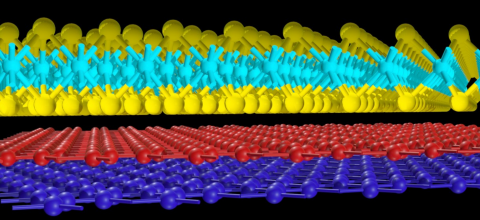 The Department of Physics congratulates its five faculty members who received 2022 Seed Fund Awards from the Brown University Office of the Vice President for Research (OVPR). Every year OVPR awards research seed funds intended to support preliminary work on projects that show substantial promise.
The Department of Physics congratulates its five faculty members who received 2022 Seed Fund Awards from the Brown University Office of the Vice President for Research (OVPR). Every year OVPR awards research seed funds intended to support preliminary work on projects that show substantial promise.
Assistant Professor of Physics Jia (Leo) Li and Professor of Physics Vesna Mitrovic received an award in which they plan to use resistively detected microwave resonance to study quantum material and develop 2D material-based quantum-bit. The funds will allow the team to build a microwave setup at Brown that can develop the microwave resonance technique by defining the parameter range for optimal operation in order to establish resistively detected microwave resonance as a powerful tool for condensed matter research. This technique could enable experimental control on quantum-bit based on 2D material structures, which is the essential ingredient for various schemes of quantum computation.
Professor of Physics Brad Marston and Co-PI Brenda Rubenstein from the Department of Chemistry were awarded funds to study statistics of classical nonlinear dynamics by quantum computation. The research team intends to use quantum computers to find the statistics of classical nonlinear dynamical systems far more efficiently than is possible with classical computers. They intend to examine a broad range of dynamical systems from those describing chemical reactions to climate models. The funds will support a Ph.D. student based in either the Department of Chemistry or Physics to work on implementing quantum linear algebra algorithms on the IonQ computer to complete the project.
Professor of Physics and Engineering Gang Xiao and Co-PI Jerome Sanes from the Department of Neuroscience were awarded funds to develop quantum magnetic tunneling junction sensor arrays for magnetoencephalography (MEG). The aim of the project is to develop a revolutionary quantum magnetic gradiometer designed to non-invasively register magnetic fields from the human brain during simple voluntary movements and visual stimulation that will substantially exceed the spatial resolution of existing systems, operate at room temperature, and not require expensive magnetic shielding. The research team expects these features to expand the utility, accuracy and accessibility of magnetic field recording technology for human neuroscience applications to advance our understanding of how the human brain functions.
Professor of Physics Gregory Tucker received an award as a Co-PI with Alex Evans, Stephen Parman and Daniel Ibarra from the Department of Earth, Environmental and Planetary Sciences (DEEPS) to study exoplanets and determine where life may exist beyond Earth. The researchers aim to utilize DEEPS expertise in modeling the linked tectonic, volcanic, and atmospheric evolution of planetary bodies coupled with the expertise in Physics in exoplanet/stellar observations in order to reliably infer surface properties of exoplanets and identify environments capable of sustaining life.
The funding for each of these projects is intended to support activities necessary to advance research proposals with the expectation that a competitive proposal for a sizable project will be submitted to an external funding organization within a year of the completion of the seed fund period.